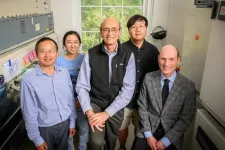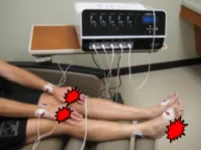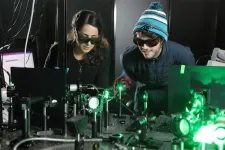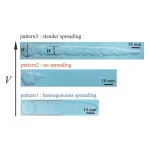(Press-News.org) CHAMPAIGN, Ill. — Scientists have identified a protein that plays a pivotal role in the action of several emerging cancer therapies. The researchers say the discovery will likely aid efforts to fine-tune the use of immunotherapies against several challenging cancers. They report their findings in the journal Cancer Research.
“Most anticancer drugs cause cancer cells to shrivel up and die in a controlled process known as apoptosis. But apoptosis does not usually strongly activate immune cells,” said David Shapiro, a professor of biochemistry at the University of Illinois Urbana-Champaign who led the research with former graduate student Santanu Ghosh. “However, a few emerging cancer therapies cause cancer cells to swell up and burst. The protein we identified, a sodium-ion channel known as TRPM4, is critical for cancer therapies that promote this type of cell death, called necrosis.”
Unlike apoptosis, necrosis strongly signals the immune system to target and cleanup the remains of the dying cells, Shapiro said. “This suggests that treatments that promote necrosis may improve immunotherapies against solid tumors,” he said.
TRPM4 is the first protein mediator of anticancer therapy-induced necrosis to be described, Shapiro said.
In previous work, Shapiro, U. of I. chemistry professor and study co-author Paul Hergenrother and their colleagues developed two drugs – a compound called BHPI and later, a more effective agent known as ErSO – that spur necrosis in solid tumors, dramatically shrinking and often eradicating primary and metastatic tumors in mice. These drugs work by binding to estrogen receptors on cancer cells and pushing a normally protective cellular stress-response pathway into overdrive. This pathway, the “anticipatory unfolded protein response, or a-UPR,” ultimately causes the cell to swell, leak and die.
“Even though we identified the initial steps in the a-UPR pathway that kills cancer cells, the specific proteins that mediate cell swelling, rupture and rapid necrotic cell death remained unknown,” Shapiro said.
To identify the relevant proteins, Shapiro and his colleagues screened breast cancer cells by knocking out each of the roughly 20,000 individual genes in the cancer cells and then treating the altered cells with BHPI or ErSO. Cells that resisted treatments with these agents revealed which genes were essential to the drugs’ effectiveness.
The researchers were surprised to find that TRPM4 emerged as a key driver of the process of necrosis in cancer cells treated with ErSO and BHPI. The team also found that TRPM4 was important for the activity of several other necrosis-inducing cancer therapies.
“This will enable physicians to identify patients most likely to benefit from necrosis-inducing therapies because their cancers have high TRPM4 levels,” Shapiro said.
Further study revealed that an ErSO-induced increase in intracellular calcium causes the TRPM4 channel to open, allowing sodium ions and water to flow into the cell. The influx causes the cell to swell, rupture and leak, activating immune cells and causing them to rush to the site of the dead cells.
“Cancer treatment has been transformed by immunotherapy, which takes the brakes off immune cells, enabling them to attack cancer cells,” Shapiro said. “But immunotherapy has had limited success against solid tumors such as ER-positive breast cancer and pancreatic cancer.”
By targeting the TRPM4 pathway in solid tumors, scientists may further enhance the necrosis-inducing anticancer therapies available to fight such tumors, he said.
“We found that the cancer drug ErSO acts like the starter on a car that turns over the engine and then is no longer needed once the engine is running,” Ghosh said. “It is the swelling caused by TRPM4 that drives the lethal stress that kills the cancer cells. As little as a one-hour exposure to ErSO effectively killed cancer cells days later.”
The National Institutes of Health, the Cancer Center at Illinois, the Department of Defense Breast Cancer Research Program, the Susan Komen Foundation and the Breast Cancer Research Foundation supported this research.
Hergenrother is the deputy director and Shapiro is a researcher in the Cancer Center at Illinois. Hergenrother also is an affiliate of the Carl R. Woese Institute for Genomic Biology and the Carle Illinois College of Medicine at Illinois. Ghosh is now a postdoctoral researcher at the University of Pennsylvania Perelman School of Medicine.
Co-authors of the study also include undergraduate student Rachel Yang, graduate students Darjan Duraki, Junyao Zhu, Ji Eun Kim, Musarrat Jabeen, Xinyi Dai, Mara Livezey and Matthew Boudreau; research scientist Chengjian Mao; U. of I. molecular and integrative physiology professor Erik Nelson; and professor Ben Park, of Vanderbilt University College of Medicine.
EMBARGOED FOR RELEASE UNTIL 9:00 A.M. CDT JULY 31 (MONDAY)
Editor’s note:
To reach David Shapiro, email djshapir@illinois.edu
The paper “Plasma membrane channel TRPM4 mediates immunogenic therapy-induced necrosis” is available to members of the media from the U. of I. News Bureau.
END
Team identifies key driver of cancer cell death pathway that activates immune cells
2023-07-31
ELSE PRESS RELEASES FROM THIS DATE:
Scrambler therapy may offer lasting relief for chronic pain, review paper suggests
2023-07-31
FOR IMMEDIATE RELEASE
A new review paper co-authored by two Johns Hopkins pain experts suggests that scrambler therapy, a noninvasive pain treatment, can yield significant relief for approximately 80%–90% of patients with chronic pain, and it may be more effective than another noninvasive therapy: transcutaneous electrical nerve stimulation (TENS). The write-up was published online July 13 in The New England Journal of Medicine.
Scrambler therapy, approved by the U.S. Food and Drug Administration in 2009, administers electrical stimulation through the skin via electrodes placed in areas of the body above and below where chronic pain is felt. The goal is to capture the nerve endings ...
Icahn School of Medicine at Mount Sinai receives $11.5 million grant renewal to study the impact of psychosocial stress on cardiovascular disease
2023-07-31
New York, NY (July 31, 2023)—Psychosocial stress profoundly affects people’s lives globally, not least because it can be a critical risk factor for cardiovascular disease. Thanks to an $11.5 million award renewal from the National Heart, Lung, and Blood Institute (NHLBI) of the National Institutes of Health, distinguished researchers at the Icahn School of Medicine at Mount Sinai and elsewhere aim to gain a deeper understanding of how stress influences cardiovascular health.
“To address residual cardiovascular risk in patients, our research program aims to bolster our mechanistic understanding ...
Way cool: UVA professor developing ‘freeze ray’ technology for the Air Force
2023-07-31
You know that freeze-ray gun that “Batman” villain Mr. Freeze uses to “ice” his enemies? A University of Virginia professor thinks he may have figured out how to make one in real life.
The discovery – which, unexpectedly, relies on heat-generating plasma – is not meant for weaponry, however. Mechanical and aerospace engineering professor Patrick Hopkins wants to create on-demand surface cooling for electronics inside spacecraft and high-altitude jets.
“That’s the primary problem right now,” Hopkins said. “A lot of electronics on board heat up, but they have no way to cool down.”
The U.S. Air Force likes the prospect of a freeze ...
Bees likely evolved from ancient supercontinent, earlier than suspected
2023-07-31
PULLMAN, Wash. –The origin of bees is tens of millions of years older than most previous estimates, a new study shows.
A team led by Washington State University researchers traced the bee genealogy back more than 120 million years to an ancient supercontinent, Gondwana, which included today’s continents of Africa and South America.
In a study that proposes a new evolutionary history of bees, the researchers found evidence that bees originated earlier, diversified faster and spread wider than many scientists previously suspected. They published their findings in the journal Current ...
Routinely drinking alcohol may raise blood pressure even in adults without hypertension
2023-07-31
Research Highlights:
An analysis of data from seven studies involving more than 19,000 adults in the United States, Korea and Japan found a clear association between increases in systolic (top-number) blood pressure and the number of alcoholic beverages consumed daily.
Even people who drank one alcoholic beverage per day showed a link to higher blood pressure when compared to non-drinkers, reinforcing the American Heart Association’s advice to limit alcohol intake and to not start drinking alcohol if you do not already.
Embargoed until ...
This disease can be caused by a food allergy and prevent children from eating. A new study may show how to treat it
2023-07-31
A new study from Tulane University has identified a new treatment for a chronic immune system disease that can prevent children from eating.
Eosinophilic esophagitis (EoE) is triggered by food allergies or airborne allergens which causes a type of white blood cell, eosinophils, to build up in the lining of the esophagus. This causes the esophagus to shorten and the esophageal wall to thicken, making swallowing difficult and causing food to get stuck in the throat.
The disease occurs in an estimated 1 in 2,000 adults but more frequently affects children (1 in 1,500) where symptoms can be harder to diagnose and pose greater risks as difficulty feeding can lead to malnutrition, weight loss and ...
Oxycodone prescriptions after delivery not linked to longer-term opioid use compared to codeine prescriptions
2023-07-31
Postpartum prescriptions for oxycodone were not associated with increased risk of longer-term opioid use compared to codeine prescriptions, according to new research published in CMAJ (Canadian Medical Association Journal) https://www.cmaj.ca/lookup/doi/10.1503/cmaj.221351.
Over the last 10 years, there has been a shift to fewer codeine prescriptions and an increase in prescriptions for stronger opioids, such as hydrocodone, hydromorphone and oxycodone for patients postpartum.
“This occurred in part ...
Novel vaccine may hold key to prevent or reduce the impact of Alzheimer’s disease
2023-07-30
Research Highlights:
A novel vaccine that targets a protein involved in Alzheimer’s disease helped eliminate toxic cells in mice with the condition.
After vaccination, the mice had fewer amyloid plaques and less inflammation in brain tissue and showed improvement in behavior and awareness.
Embargoed until 12 p.m. CT/1 p.m. ET, Sunday, July 30, 2023
BOSTON, July 30, 2023 — A novel vaccine that targets inflamed brain cells associated with Alzheimer’s disease may hold the key to potentially preventing or modifying the course of the disease, according to preliminary research presented at the American Heart Association’s Basic Cardiovascular Sciences Scientific ...
To spread or slide? Scientists uncover how foams are spread on surfaces
2023-07-29
Tokyo, Japan – Researchers from Tokyo Metropolitan University have uncovered the physics behind how foams are spread on surfaces. Balls of foam placed on a flat substrate were scraped across with a plate and observed. They identified different patterns which strongly depend on the scraping speed, governed by competing physical phenomena. Their findings apply to all kinds of soft materials that need to be spread evenly on surfaces, from mayonnaise on bread to insulation on walls.
Whether ...
How to save the NHS – an expert prescription
2023-07-29
Whether it’s setting up a Bank of England-type body to run it or fining patients for missing appointments, healthcare leaders, policymakers and practitioners past and present have a wealth of ideas about how they would change the NHS for the better.
Professor Dinesh Bhugra, a psychiatrist and former president of the British Medical Association and the Royal College of Psychologists, asked 14 peers, physicians and patients’ representatives for their prescription for the NHS.
The interviews are reproduced in Professor Bhugra’s new book, Conversations about the NHS. Thought-provoking and in some cases, controversial, ideas include:
Setting ...





